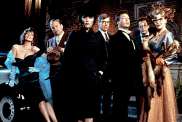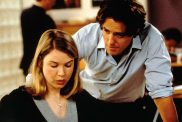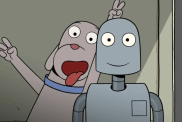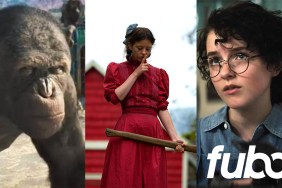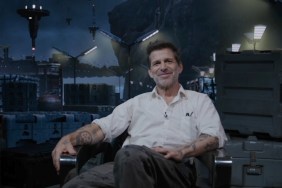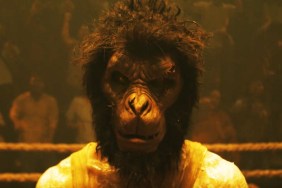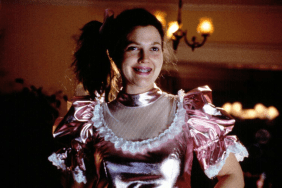ComingSoon.net caught up with Short to talk about the film, opening in theaters on Friday:
ComingSoon.net: Had you done any step dancing before this movie?
Columbus Short: Yeah, I toured with the show “Stomp” for a while.
CS: Is that step?
Short: It’s the same. The language is the same. We did stuff with our bodies and the same thing; it’s more individual than this. Stepping is more unified; it’s the same, both originated from African boot dancing that got brought over to the US in 1906. That’s when they kind of adopted the form, the dance form.
CS: Were you concerned about coming correctly?
Short: It’s funny you should ask that because I felt like because I understood the language, that was the least of my concern. I felt like I was going to take what I know from Stomp, I’m going to take what I know as a musician, and my musicality, and I’m going to apply it to stepping; and I felt I was going to do some things people weren’t going to see before. My main concern was making sure the artistic credibility of the character was there, and the authenticity of the project was there; I did a lot of character development and a lot of thought in who DJ was. I know he’s some guy, Anywhere USA, but I wanted to really delve into that; that was the most important thing to me. The dancing is kind of in my DNA.
CS: Did you feel the weight of this being a 100-year-old dance form?
Short: It didn’t hit me until I got there, when I first had a bit of ignorance to the whole history behind the fraternal order and the stepping. But, once I got there, I started understanding, I’m going to rep you guys . I met a lot of the Divine Nine, from Alpha’s, Sigma’s, Delta’s, Kappa’s, AKA’s, Q’s. So I met these guys and really got to chop it up with them and get the history.
CS: What were their concerns?
Short: “Man, you gotta come correct.” That’s all they kept saying; “You gotta come correct, you gotta represent us.” And I said, “Don’t worry, I’m going to do it.” And they saw; they were on set on the day we shot the finale number. After we came off stage, ’cause a lot of the extras were from HBCU’s fraternities and sororities; they said, “Man, that was killing, you guys were killing it.” So it meant a lot that we did them justice, and I hope that the people who weren’t on set will get to see this film on the 12th or after feel the same way.
CS: Do you think shooting in Atlanta helped compared to L.A.?
Short: Yeah, because L.A.’s a different beast; art reflected life in a big sense when I went to Atlanta from L.A. When I touched down, I was like, “wow”; Atlanta’s a completely different moment, and a completely different culture out there. Especially on the campuses, we were on Spellman, Clark, Morehouse campus; so getting out there and being around that environment really put you in the mode.

Short: Morris Brown College which is shut down now; it’s sad, it’s sad – you’ve got this whole college campus that’s empty, and you have a lot of kids who want to go to college, don’t have the money to go to college, and there’s a college campus that’s shut down – so that’s sad. But we shot there the majority of the time.
CS: And that’s where Heritage Hall was?
Short: Yeah, actually that’s my favorite scene in the movie. I didn’t go in to see it; they wanted to show me the set before. I said, “let’s not rehearse it, let’s just shoot it, Sylvain.” I wanted to go in and experience it with DJ, I wanted to experience it at that moment right there on the spot. So I said, “I don’t want to go in there; let me go in there when I go in there as DJ.” That whole scene was really genuine; I was really surprised. I didn’t know Martin Luther King was in a fraternity, I didn’t know Betty Shabazz, I didn’t know these people, Coretta Scott King, I didn’t know these people were it – and that’s how far back it’s dated. It blew me away, Michael Jordan was a Q. I didn’t know that so it was a compelling scene for me.
CS: What kinds of personal things did you take away?
Short: As an actor I learned at some point you have to stop acting. At some point you just let it possess you; whatever that being, let it possess you, and you want to become what you’re representing ’cause it’s such a fragile and delicate group of an organization we’re trying to emulate and depict. It was really important to me that we represented that to the utmost and fullest; so when I came off that, it took my acting to the next level, ’cause it’s not about what’s written on the lines, it’s about what you deliver. Coming off that and going into “Studio 60,” it helped me a lot of just trusting what the writer wrote, you can live it, not just say it and have anyone believe you.
CS: So can you choose between South Harmon or Truth?
Short: Whoo, it’s funny because I’m a mix of a lot of different things. I went to Orange County High School for the Arts, which is a predominantly white high school. I was one of a few African Americans who attended, so I have that and I love that and that’s what South Harmon was, so I was comfortable there. But I think Truth, something about your roots, there’s nothing like it; when I went to Atlanta, that’s what that was. There are affluent African Americans, there’s a lot of wealthy African Americans in Atlanta, and well to do, and educated; it’s different than LA cause everyone lives here, but a lot of people aren’t – they moved here from there. And they’re educated, and they own businesses, and they’re running corporations, and they’re CEO’s, and it blew me away. There’s something about that just really touched my heart and really put me in touch with my African American – so I’d have to say Truth.
CS: Are you ready to pledge Grad Chapter now?
Short: I want to pledge Alpha Phi Alpha.
CS: Why?
Short: Hanging out with all of them, not only the producers – the producers were Alpha – but hanging out with all of them, I kind of got the feel of where you would fit, where one would fit. The Q’s are big guys, they’re football players, huge; the Kappa’s are the pretty boys, with the canes. But the Kappa’s are smooth.
CS: How did you educate yourself on the traditions?
Short: The significance, for those who don’t know, we don’t really hit on it in the movie, and I’m kind of irritated that we didn’t. It’s a pertinent part of what fraternities and sororities do. They do so much community service, they do a lot in the community; they do a lot of stuff for the youth, and outreaching and community betterment. I wish we touched on that a little in the movie, but those are huge important things about the tradition. And then for example, the things that long live after you graduate – let’s say I graduate and I move to L.A., I’m a Kappa and I go to get a job at Pacific BMW and the manager of Pacific BMW is a Kappa – out of five applicants and I’m the only Kappa, I’m probably going to get that job. That’s the type of loyalty and brotherhood. My mom’s in AKA, and I moved to San Francisco when I was 17, I had no place to live yet. I moved there to do “Stomp,” and they didn’t pay for our room and board. It was a sit down company. She called her friend who was a sorority sister – I had never met her and didn’t know who the woman was – she took me in like her son. That’s the long term brotherhood and sisterhood that these fraternities hold, so it’s huge.
CS: What about the stepping traditions?
Short: The stepping, what that rivalry is, it comes from the African Boot Dance; but when they step, they’re representing their fraternity, and they’re rivaling they’re rivalry. So they’re battling the opposing fraternity. The Kappa’s are battling the Q’s, the Q’s are going after the Alpha’s. And you start to see, each fraternity has different styles – the Q’s stomp hard, they’re like “Hu, Ha”; they’re not as intricate, but they’re… The Sigma’s are fast and swifty, and the Alpha’s are like (does twirling noise); the Kappa’s have tricks, they’re throwing their canes, they’re twirling their canes, so you get to see that each fraternity has taken their own style and adapted it. And what was a daunting task doing the movie, and Dave Scott did a phenomenal job, the choreographer. We saw all these and we couldn’t emulate any of them; we had to come up with our own signs. I actually came up with this (snake motion) for the Theta’s because we’re the pythons – “What can we do?” ‘Cause pretty much all the signs were taken, and the Mu Gamma’s held up the ‘M.’ So we had to find, even though these were fictitious fraternities. We couldn’t emulate the Alpha’s; we’re not trying to pretend to be the Alpha’s, we’re not pretending to be the Kappa’s or the Q’s. We’re our own fraternities at that point in the film.

Short: Oh man, Meagan. Meagan is one of my closest friends. We grew up together and I’ve known Meagan since I was eight-years old. Our families are close. Her mother is my ‘aunt;’ I call her Aunt Tyra. I remember we were riding our bikes, and we had a little crew in Canyon country where we lived; I remember we said, “We’re going to do a movie together one day.” And, you know, we’re kids, so when I signed on – I was the first one signed on to this project. I remember I called Meagan and I said, “Please, here’s the opportunity; they agree, they want you to do the movie. Will you do the movie?’ And she was like, “I don’t know.” And I was like, “Meagan, please”; I convinced her and she signed on to the movie. And I think she was the perfect fit because I knew that our chemistry would be natural, it wouldn’t be forced ’cause she’s one of my best friends. Not to mention she’s freakin’ gorgeous and beautiful, so that wasn’t hard at all.
CS: Why was she a little apprehensive to sign on?
Short: Just like I was apprehensive because when you read anything about a dance movie, you’re like “oh no, oh no, here we go again.” And I didn’t want to be a part of that. Since I’ve been acting, I stopped doing the choreography for the past three or four years. I didn’t want to do anything dance. I was refusing to do anything dance. I read the script and I was like, ‘Hmm, this has the potential to have some depth to it.” And the script of the movie you saw wasn’t the script I read initially; there was a lot of creative that even I got to put in to making it more authentic. I felt this was the chance for me to be on a much smaller scale. I felt this could be the movie for me so I thought maybe I should do it and long meetings with my team and we decided I should do it.
CS: Did you and Darrin Henson get together, being you both are dancers?
Short: Man, me and Darrin; that was rough me and Darrin on set. Let me give you guys a little juicy juice. Even though we’re acting, there’s a lot of pride on the line. Nobody wants to lose, nobody wants to look bad, nobody wants to get out-danced, and so he had that. And he’s a method actor, he’s very much like that, off camera, off set, he’s still Grant; he’s still like, ‘I’m the man, I’m the man around here.’ And I’m still very much my own individual, and so we butt heads; and I like to improv in scenes. I feel if you do a take nine times, by the eighth time it’s becoming a little contrived. So you want to shake it up a bit, so I liked to shake him up; I did it with Meagan, I did it with everybody. I did it to Darrin one day and he was pissed. The director said cut and he said, “Columbus, come over here; I’m not getting what I need from Darren. I want you to call him a fa**ot. That’s something a fa**ot would say” or something like that. And I was like, “I can’t do that Sylvain.” And he was like, “Do it.” So I did it, and Darrin’s reaction; I think they cut it out of the movie, but his reaction was me saying that, that’s in the film. It was the club scene where he came up to me and Meagan, and was like, “Stop talking to my girl.” And I said that to him, and he was furious; and he was like, “If he said that to me in real life, it wouldn’t be like that.” It was a battle, but it made for competitive construction to us, so it was cool.
CS: What was it like having Chris Brown and Ne-Yo on set?
Short: Ne-Yo is a close friend of mine. I do music as well so being in the studio together – we did “Save the Last Dance 2” together; that was his first role. So I was with Ne-Yo before he turned into this superstar. We’ve kind of been coming up together so he was a close friend. I begged him to be in the movie as well. And then Chris Brown – he’s just a talent, he’s such a raw talent. We want to be the new Rat Pack. My inspirations are Gene Kelly, Fred Astaire, Donald O’Connor, Burt Lahr. Gene Kelly is the most movie star icon to me in the world to me. He could do it all. He could sing, he was charming, he could dance, he could act, he had it all. We’re trying to bring that back to Hollywood. People with a pretty face aren’t people with just a pretty face, they can act, they can dance, they can sing, and they can do it all; and that’s what made Hollywood so special back then.
CS: Fred Astaire was the every man’s dancer; is that what you aspire to be?
Short: Yeah, you think about it, back in the day you had if you look at some of the old musical movies, you had Marlon Brando and Frank Sinatra in Guys and Dolls, Gene Kelly in New York, New York. These guys danced like men, but they were graceful. Gene Kelly is so graceful, it’s ridiculous. Singin’ in the Rain, Donald O’Connor – these men were so graceful, but they were men, and they kept that prestige. They weren’t ballerinas, they had that class and that grace about them; sure I want to bring that back, but I don’t know if I’m going to be doing anymore dance, though, anytime soon. If I could do a Nicholas Brothers movie, I’d love to do that, something a little more period to go back. Or maybe go back to Broadway cause that’s what I went to school for.
CS: Would you like to go behind the scenes and do choreography on a film?
Short: No, I’ve kind of hung up my choreography. The next thing I want to do is direct. I created and directed Britney’s [Spears] tour and so I love being able to be creative and doing these last few movies has been my film school. I’ve studied with Tom Shadyac showing me the ropes, Steve Pink showing me the ropes, talking to Spielberg when I did “War of the Worlds,” and then really hands on when I did “Stomp the Yard.” They were really giving me a crash course with the cinematography, Scott Kevan; and so that’s what I really want to end up doing.

Short: It’s my dad’s name, it’s my grandfather’s name. I’m a junior, but my grandfather’s name was Columbus, but his middle name wasn’t Keith – my dad is Columbus Keith Short, and I’m Columbus Keith Short Jr. So it’s just been passed down.
CS: Nobody’s from Columbus?
Short: Nope, even though Meagan calls me Ohio. She calls me Ohio instead of my name.
CS: Do you have a name for the final move on your elbow?
Short: It was named in the script ‘The D Blaze’ and in the script. Chris does this phenomenal move in the opening and they’re going to do this whole flashback sequence and at the end I do that move. At that point when we do that scene, we were almost done with the movie, I said, “We don’t need to live and die by this move; if you take the dance out of this movie, I think we still have a movie.” So I practiced the move for about two weeks, and then I didn’t do it for two weeks and the studio came to rehearsal,and they said, “You’re not doing that, the insurance, if you get hurt, no way.” So I got to set, and we came up with a few other moves that were watered down and so I said, “We gotta do it.” And so Sylvain was like, “If you get it on this take, we’re going to go, they’ll buy it.” First take out the gate, I hit it, and everybody went crazy, and the studio was like, “Yes!” So that move was trying; I hurt myself a lot, but it paid off.
CS: Are you doing more “Studio 60”?
Short: Yeah, I have about four more episodes that are going to air.
CS: You’re the writer, but you’re headed out the door.
Short: I’m the junior writer, and the only reason I’m headed out the door is because I’m doing other films; I would love to stay around and do the show as long as I could.
